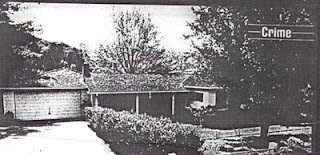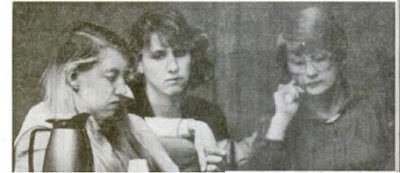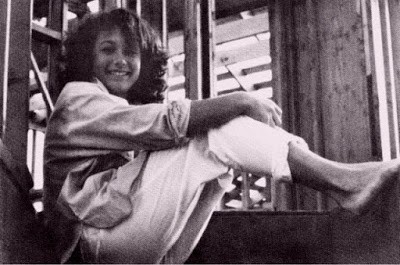 Kirsten Costas
Kirsten Costas
She was so pretty, everyone said
The more so the pity
That she was found dead
– From ?Death of a Cheerleader? by Marcy Playground
The 1980s were a decadent and excessive decade and that lifestyle , complete with designer duds, cars and big homes, was embraced by many cities through the U.S. Orinda, California was one of them. Orinda, in Contra Costa County, sits just east of Berkeley, home to the oldest University of California campus in the state and one of the most socially liberal environments in the country. While residents of Berkeley may have been attending class or leading a protest, Orinda catered to affluent suburban professionals who commuted to Oakland, San Francisco and Walnut Creek. An unfailingly friendly city (and one that would rank number two in friendliness by Forbes magazine), Orinda?s school district is noted for academic excellence; ranked first in the state, the district also has a consistent 99?100% graduation rate and pays its teachers on average $75,000 per year. Miramonte High School, the only public high school in Orinda, not only produces academics but athletes. NFL players Ken Dorsey, Bryan Barker, and Drew Bennett and Olympian Heather Petri all call Miramonte their alma mater. In 1984, Kirsten Costas was a popular sophomore at Miramonte. The fifteen-year-old was a cheerleader, a varsity swim team member, a participant of the civic group Bob-O-Links (known locally as the ?Bobbies?), and a good student. The only daughter of affluent parents, Kirsten was petite with dark, wavy hair she wore in a cute, short style of the time. She appeared to be fashionable and was later described by her friends as witty, outgoing, confident and sarcastic. Unlike many teens, she didn?t suffer through an awkward period and enjoyed going to school, where she counted working in the student office among many of her activities. So popular was she that everyone in the school knew who she was, even if they didn?t actually know her. For all intents and purposes, Kirsten Costas was leading the charmed life of teenaged dreams.
 Bernadette Protti
Bernadette Protti
Bernadette Protti, on the other hand, desperately wanted what Kirsten had. Unlike her classmate, Bernadette came from an overtaxed family, the youngest of six children. Her parents were devout Catholics; her father was a retired public works officer and her mother a homemaker. The Prottis couldn?t afford the lifestyle the Costas family could and that was the lifestyle Bernadette wanted. Like most teens and students, Bernadette was average. She had her circle of friends but she wanted that ultimate pinnacle of popularity. She wanted to succeed. She wanted to be liked. She wanted what the cute and perk Kirsten Costas had. And so she began to follow in Kirsten?s footsteps. Kirsten tried out for cheerleading, so did Bernadette. Kirsten wanted to be a member of the Year Book committee, so did Bernadette. Bernadette failed in all these missions. She did get a job in the student office alongside Kirsten, resulting in the popular girl asking Bernadette to do her friends favors. Kirsten didn?t do them herself as being caught would result in termination of privileges. Bernadette did them, hoping to gain favor. She was also permitted entry in the Bobbies, also alongside Kirsten. Ostensibly a volunteer group designed to organize fundraisers and other charitable events in the community, it was allegedly more of a sorority dedicated to parties and fun. Despite her acceptance into the Bobbies, Bernadette was not satisfied. She had figured that by circling Kirsten?s orbit she could entice her into friendship. Kirsten, however, had no desire to be friends with the wannabe and follower. A planned ski trip ended disastrously for Bernadette. She had worked babysitting jobs in order to pay for the trip. Her ski clothing and equipment was purchased secondhand or borrowed from others. Kirsten?s own clothing and equipment was new, costly and trendy. She commented on Bernadette?s own belongings, comments that stung the girl that was acutely aware of the haves and have nots. Instead of the cruel comments souring Bernadette on Kirsten, they only seemed to deepen her obsession to be popular and liked. Especially by Kirsten Costas. By the end of the 1984 school year and beginning of summer, Bernadette Protti had come up with a plan to win over Kirsten. In mid-June, knowing that Kirsten was away at cheerleader camp, Bernadette called the Costas home from a pay phone. She told Kirsten?s mother that there was a dinner planned for the following Saturday for new Bobbies and that it was a secret only for Bobbies to know. While she didn?t give out her name, she said she would pick Kirsten up for the dinner around 8:30 p.m. Bernadette told her parents she had a babysitting job that Saturday night and would need the car. The ruse worked, allowing her to show up at the Costas residence as planned to pick up Kirsten. When Kirsten ran to the car, after the honk in the driveway, she was surely disappointed to see Bernadette rather than one of her usual peers. Despite this, she climbed into the car to head to what she thought was a Bobbie dinner but she likely realized quickly that wasn?t so given that Bernadette was dressed in a track suit and faded jacket. When confronted, Bernadette admitted the dinner was a fabrication she had made up for Mrs. Costas? benefit so that Kirsten would be able to go to a party. Kirsten also noticed a knife in the car, which Bernadette laughed off, saying that her sister kept in there in order to cut up fruits and vegetables. This didn?t seem to bother Kirsten. The duo had by then reached the town or Moraga where, according to Bernadette, she was instructed her to pull into a church parking lot so her passenger could smoke some pot. They sat there for 40 minutes, again according to Bernadette, with Kirsten offering her a hit of the joint. This, according to Bernadette, was what started the argument as she turned Kirsten down. Later on, however, Bernadette?s friends and classmates would dispute the likelihood of this statement as they felt Bernadette, always a follower and desperate to be accepted, would quickly have smoked the marijuana if it gained her acceptance. Kirsten also asked about the party that Bernadette had mentioned and learned that Bernadette?s invitation was of a second-hand nature. Kirsten flat out refused to attend a party in which she hadn?t truly been invited, leading Bernadette to protest that Kirsten was going to ?spoil everything,? to which the popular girl responded there was never anything to spoil. This led to Bernadette crying and asking why Kirsten was so mean, why she wouldn?t be her friend. In response, Kirsten rolled her eyes, leading to Bernadette verbalizing how much she admired Kirsten and wanted to be like her. Kirsten saw these confessions as pathetic and told as much to Bernadette. It was at this point that Kirsten left the car and ended up at the home of Alexander and Mary Jane Arnold. Kirsten told the couple, who she knew, that she had been out with a friend but the friend had gotten ?weird? on her. She asked if she could use their phone to call her parents, something that was readily agreed to. With no answer at the Costas residence, as everyone was out, Alex Arnold offered to drive her home. He later recalled that Kirsten was calm and talkative, speaking of school activities and her social life. If she had been concerned about her interaction with Bernadette, she didn?t show it. Bernadette, who had watched Kirsten leave the car and enter the Arnold home, now followed them back to Orinda. Her panic and anger increased with each mile, as she figured that Kirsten would revel in gossiping about her to the other popular kids. Any chance she may have had to enter the inner sanctum of Kirsten Costas was surely destroyed.
 The scene of the crime
The scene of the crime
Arriving at her home, Kirsten at first started toward the house but then changed course and headed for where Bernadette had pulled in and parked on the street. Bernadette grabbed the knife from the car and met Kirsten on the lawn of her neighbor?s house. Kirsten backed up and yelled at Bernadette to go away. Bernadette responded by attacking Kirsten with the knife, stabbing her twice in the stomach with the 18 inch blade. Kirsten?s hand was hit as she held it up to protect herself. As she fell to the ground, Bernadette stabbed her twice in the back before running to her car and quickly taking off. Alexander Arnold, who had remained in his car to see Kirsten safely into a house, had seen a figure rush the teen, heard an altercation and seen Kirsten fall. Assuming a fist fight had taken place, he took off in hot pursuit of the Ford Pinto that had so quickly left the scene. He didn?t know that Kirsten Costas had been fatally assaulted. Kirsten had gotten to her feet and staggered to her neighbor?s house, banging on the front door. She collapsed as Arthur Hillman opened the door. Hillman cradled the bleeding girl and yelled for his son to call 911. He asked Kirsten who had stabbed her but reportedly the only thing she said was that she couldn?t breathe. Kirsten was taken to the hospital by ambulance as police began securing the scene. Alexander Arnold returned, unable to catch the car he had pursued, and told officers what he saw transpire and what Kirsten had mentioned about the ?weird friend.? He also described Kirsten?s attacker as a chunky teenaged girl with stringy blonde hair, attired in track pants and driving a Ford Pinto. Meanwhile, Bernadette had arrived home around 10 p.m. Figuring Kirsten had told the police who stabbed her, she waited for the cops to arrive and place her in cuffs. It didn?t happen. Instead, Bernadette took a late evening walk with her mother. By 11 p.m. on Saturday, June 23, 1984, Kirsten Costas was pronounced dead. One of the stab wounds she suffered had bisected the major artery to her heart. The community of Orinda was shocked and horrified by Kirsten?s murder. Homicide was not common in their safe hamlet, especially a brutal attack on a teen girl. Hundreds of mourners turned out for Kirsten?s funeral, including a crying Bernadette Protti. Investigators began questioning students, including Bernadette who also took a lie detector test. The results were inconclusive, proving neither guilt nor innocence. Bernadette?s proffered alibi of babysitting went unverified. Nancy Kane, a ?goth? girl who had been picked on by Kirsten, was bullied by students who believed she was responsible for killing Kirsten. She had at one time ran with the crowd Kirsten was in but had fallen out with them. Her prickly relationship with Kirsten at the time of the murder was well known at Miramonte. So excessive were the rumors and innuendo about Nancy that her mother would not allow her to take a lie detector test and the girl transferred to another school in September. While this transfer may have made life easier for Nancy, it seemed to cement the belief that she was guilty. Of course, rumors and theories were everywhere. Orinda residents wanted to believe that the crime was committed by an outsider. Surely one of their own could never do this. A new school year started, one without Kirsten Costas. Bernadette Protti continued on with her life as a student and Bobbie. She didn?t know ? how could she? ? that the Orinda police had contacted the FBI to request a profile on the person who murdered Kirsten. The FBI?s profile arrived in October of 1984. The profile stated that Kirsten?s killer would be a girl of the same age as the victim and Kirsten would have known her. The biggest surprise as far as the Orinda police were concerned was that the murderer would not be remorseful. They had been questioning persons believing the guilty individual would break down. Kirsten?s parents, Berit and Arthur Costas, had hired a private investigator to find the killer of their daughter. It was while he was reviewing the case files and evidence that he noticed Bernadette?s alibi. He made the call to the family she claimed to have been babysitting for that night and found her alibi didn?t hold water. He then notified the detectives. On December 9, 1984, Bernadette was interviewed a second time. The detectives read the FBI?s profile to her and asked if it sounded like anyone she knew. ?Me,? she told them. She wasn?t arrested at that point. She told detectives she needed time to think. The detectives surely knew they had their killer and were hoping for a confession. Bernadette returned home and tried to talk to her mother who begged off, claiming exhaustion. Instead, Bernadette wrote her parents a letter in which she confessed to killing Kirsten. She wrote that she was able to live with it [killing Kirsten] but couldn?t ignore it. She also begged her parents to still love her. In a postscript, she asked them not to ask why she had done such a thing because she claimed she didn?t know. Bernadette then left the letter with her mother, asking her to wait 30 minutes before reading it, and headed to school. Once the note was read, the Prottis hauled ass to Miramonte, picked up their daughter and took her to the police station. Her confession, recorded at that time, had a tearful Bernadette stating she felt inferior to the popular and confident Kirsten. She also said that she was embarrassed by her family?s socio-economic standing and Kirsten?s comments on the same.
 Bernadette (left) in the courtroom with her sister and mother
Bernadette (left) in the courtroom with her sister and mother
Despite Bernadette Protti?s confession, the prosecutor elected to take the matter to trial. Whether she was convicted for first or second degree murder, given her age, the sentencing would be the same. The plea offered by Bernadette?s defense team, in which she would plead to second degree murder, was rejected. The resulting three days of testimony in front of a judge but no jury was nothing short of entertainment for the community and torture for the Costas and Protti families. Despite the prosecution?s attempts to show that Bernadette had premeditated Kirsten?s homicide, the judge found her guilty of second degree murder. On April 1, 1985 ? April Fool?s Day, of all things ? Bernadette Protti was sentenced to the maximum ? nine years. Bernadette was sent to the California Youth Authority in Ventura, where she would complete high school and receive her GED. She was paroled after seven years, gaining release at the age of twenty-three, on June 10, 1992 ? nearly the eight year anniversary of Kirsten?s death. She left California, changed her name, got a career, married and had children. The Costas family ? Berit, Arthur and son Peter ? left Orinda for Alaska and then Hawaii. Having begged for Bernadette not to be granted early release, they were understandably disgusted and discouraged with the justice system. In 1994, a made for television movie was produced about the case. Called A Friend to Die For in the U.S. and Death of a Cheerleader in the U.K., it featured television stars Kellie Martin (in the Bernadette role) and Tori Spelling (in the Kirsten role.) Martin?s character, petite and brunette, was portrayed sympathetically; Spelling?s character, taller and blonde, was seen as a mean, vicious yet popular girl who may have deserved what she got. In the years since the crime, the trial and Bernadette?s release, former friends and students have spoken little about the events. Those who have whisper of a possibility that Bernadette had propositioned Kirsten, leading to gay panic, something very real back in 1984 where lesbianism was something unusual, to be feared and/or mocked. Others shake their heads over Kirsten?s reported ?mean girl? antics and habit of thinly disguised and often cruel barbs. Bernadette?s sister Gina had testified at trial that she routinely kept a knife in the Pinto in order to cut fruits and veggies, as Bernadette said she told Kirsten. The Costas family, however, disputed that then and now. It does seem unlikely that someone ? anyone ? would choose an 18-inch knife in order to pare fruits and vegetables. The Costas family also believes that Bernadette had no intention of taking Kirsten to the party that night, citing her attire. Only Kirsten Costas and Bernadette Protti know with absolute certainty what happened that night. Bullying was not taken as seriously in 1984 as it is today. In fact, it wasn?t even termed bullying. Getting picked on or doing the teasing was considered a relatively normal rite of passage then, with the idea that the picker would grow out of it and the pickee should just ignore what was going on. Nobody seemed to give serious thought as to the emotional damage that could be inflicted on the victim. That said, no matter how cruel Kirsten Costas may have been she didn?t deserve to die. Teens are notoriously blind as to how their actions and attitudes affect others. Kirsten had been described as witty and sarcastic by her friends. It?s entirely possible that any barbs Kirsten made had been done under the cover of wit and sarcasm. For Bernadette Protti, a teen girl with debilitating self-esteem, Kirsten?s refusal of her friendship, after cracks on her appearance, would have been devastating. For teen girls, appearance ? physical and economic ? is everything. In Bernadette?s mind, Kirsten held the cards for everything. She could open the doors to popularity or permanently close them. I don?t doubt that her single-minded desire for what Kirsten had became an unhealthy obsession. As to whether Bernadette planned to kill Kirsten that June night, it?s impossible to say with certainty. Had she become so angry, so deluded that she calmly and coldly planned to eliminate the girl she saw as both a role model and rival? Or did she snap in the equivalent of a crime of passion, caught up in the heat of the moment? I don?t know but I think the Costas family has good arguments, based on the size and ferocity of the knife she used and her clothing. Would Bernadette, a girl so desperate to be popular and so keenly aware of appearances ? especially in the image-conscious 1980s ? plan to attend a party in track pants and faded jacket? Whatever the truth of the motive, Kirsten Costas died exactly one month shy of her sixteenth birthday, choking on her own blood. She would never graduate from high school, never go to college, never marry and have a family of her own. The Costas family would lose a daughter and sister. Bernadette Protti?s family would have to live with the knowledge that their daughter and sister is a murderer. She too would lose years of her life to the juvenile justice system. Unlike Kirsten, however, she lived on, able to finish school, have a career and family. The notoriety of the case has led to two songs. One, by Marcy Playground, is called ?Death of a Cheerleader.? The other is (unbelievably) called ?Bernadette Protti? and is performed by Seeing Means More. What do you think? Have you heard of this case? Have you seen the made-for-television movie? Do you think justice was served in this case? Or did Bernadette Protti get away with her crime?
 Kirsten Marina Costas/July 23, 1968 ? June 12, 1984
Kirsten Marina Costas/July 23, 1968 ? June 12, 1984

